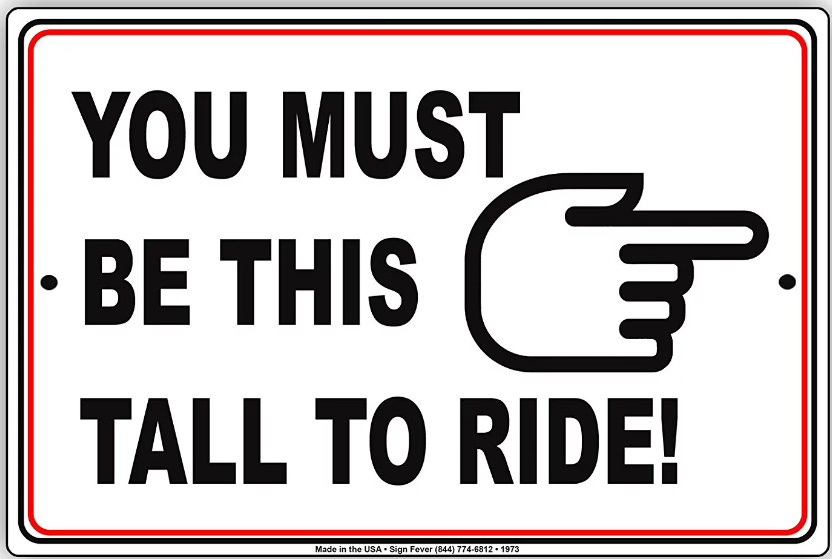As I write, highly civilized human beings are flying overhead, trying to kill me.
This is the first line of George Orwell’s inimitable essay England Your England, and it is one of my favorite opening sentences ever penned. Thankfully, my life is not under threat, although there is an unusual number of highly civilized human beings flying overhead. This is because I am currently writing during a punishing six-hour layover in a Las Vegas airport. After spending the holidays with family in Southern California and attending the wedding of two dear friends, I am now en route to my home in New York City. 2024 is officially here and, like many of you, my heart is full with the promise of new beginnings.
In today’s newsletter, I share a few thoughts on the topic of resolutions, starting something new, and failure. Before we begin, I want to greet those of you who have subscribed since the last newsletter. Welcome! In today’s economy, there is no shortage of people wanting access to your inbox and I promise not to take that privilege for granted. If you are new to Prolix, please consider subscribing by clicking the button below. I am certain that you won’t regret it.
Now, on with the show.
In the Beginning…
Great authors know the advantage of a powerful opening. Psychologists call it the primacy effect. The rest of us call it a first impression. We intuitively understand that natal moments, whether with a book, a person, a place, or a new year, often set the trajectory for what follows. A grandmaster could talk for hours on the disproportionate influence that his or her first few moves has on the chess game’s development. And which of us hasn’t experienced the ease into which a rough morning can turn into a bad day? Frank Herbert, in the first line of Dune, articulates it this way:
“A beginning is the time for taking the most delicate care that the balances are correct.”
Herbert was a smart man and I don’t suspect that he was blind to the irony of beginning his book with a statement about beginnings. One might wonder if the above line was meant to be a sincere kickoff to the story or was actually a disclosure about his writing process. I prefer the latter, honestly, because there is something endearing about an acclaimed author being so transparently self-conscious. I believe that starting anything, regardless of your status, is a vulnerable experience. Not only are you required to pass through all the awkward stages of uncertainty, but you have to survive swarms of self-doubt and insecurity: whether it's with an instrument, a pen, a paintbrush, a computer, gym equipment, or relationship. Being a beginner means placing yourself on the inferior side of comparison. It’s becoming comfortable with laying on the balance scale and having your end be the one that flies upward.
This makes me reflect on the last ten years of my life and how I’ve recently begun to doubt the notion that a youth’s competitive edge is their energy, potential, or passion. Instead, I think it is the generosity that youthfulness universally inspires in people of goodwill. When you’re young, individuals are simply more willing to tolerate your nescience, ineptitude, blunders, and endless questions. There’s no expectation for a young person to have things figured out, so those people who themselves were guided by someone wiser decide to pass it forward. Committing to receive this generosity rather than spurn it, even when it came in condescending packages, was one of the best decisions I ever made. If you are young and still have access to this unique kind of privilege, I encourage you to lean into it fully. Beginner’s luck is great, but beginner’s leniency is even better.
This concept of starting small and starting poorly isn’t a particularly novel insight, but it is worth repeating. I particularly love how Joe Gargery says it in Dickens’ classic book, Great Expectations:
You must be a common scholar before you can be an uncommon one, I should hope! Even the king upon his throne, with his crown upon his head, can’t sit and write his acts of Parliament in print, without having begun, when he were an unpromoted Prince, with the alphabet.”
The paradox with being a beginner is that it is a humble position, but that it is easily confused as the opposite. After all, starting something new is an implicit vote in your own potential. It’s a statement to all spectators — real or imagined — that you believe you are capable of excelling.
I have found that the majority of my fears do not stem from the potential of unrecoverable loss, but from the fear of being caught believing in myself. I am confident in my ability to recover from the material aspect of a faux paus, but the embarrassment of others witnessing the shattering of my delusions of grandeur? That's painful. Perhaps this is an overly personal confession to make online, but I suspect this is a pretty common feeling.
For instance, most comedians admit to having deep insecurities which lead them to make self-deprecating jokes early in their youth. The comic’s self-effacement is a way of beating people to the punchline and therefore robbing others of the capacity to make a joke at their expense. It’s a mindset that says, “Noone can make fun of me if I make fun of myself first. If I demonstrate self-awareness of my own deficiencies, their opinions can’t hurt me, and at least I can get them to laugh with me rather than at me.” Many of the attempts I self-sabotage or abort early are rooted in a similar mindset. I’d rather quit (or never start) than be guilty of misplaced ambition. While this seems like a conservative route in the short term, the long-term consequence is stagnation. Rebranding insecurity as risk-mitigation might fool your shareholders, but it won’t fool the market. At the end of the day, growth is spelled T-R-Y.
Automate or Motivate?
Not every new effort needs to be a blind effort. It’s appropriate that a sci-fi author like Herbert would make the above observation about balance, since space travel is a complicated endeavor (literally rocket science) that requires immense diligence and tedious organization. Just two weeks ago, Jeff Bezos’ space company Blue Origin had to delay their only launch of the year due to unfavorable imbalances with the weather. Their previous attempt resulted in a massive explosion — or a “rapid unscheduled disassembly” as rival SpaceX is fond of calling them. Both companies know that the success of a launch is not just dependent on its operation, but also its preparation. The same is true for resolutions, fresh starts, and new beginnings.
James Clear, in his award-winning book Atomic Habits, puts it this way:
You do not rise to the level of your goals. You fall to the level of your systems.
This is a slightly different approach than the traditional conception of discipline. The budget you make, the gym clothes you lay out the night before, the screen time parameters that you set, or the recurring “call this person” calendar event, are the systems that carry you toward your goals when your discipline falters. In this sense, a well-designed system reduces the need for personal volition or intrinsic enthusiasm. Establishing supportive systems, creating strong rhythms, and making realistic plans are reliable methods to ensure that the balances are correct. As conventional wisdom says: if you fail to plan, then you plan to fail.
On the Merits of Failure
There is something to be said about planning to fail though. I do not mean that we should intentionally aim to be unsuccessful nor do I mean that we should monomaniacally “celebrate failure.” Rather, planning to fail means holding realistic expectations about perfection — i.e. that it doesn’t exist. The cultural rhetoric often associated with “embracing failure” has always seemed like an overcorrection to me. In an effort to avoid the destructive tendencies of idealists and hyper-hierarchists, we fall prey to a relativism of achievement incongruent with reality. As an old coach of mine used to say, “Show me a good loser, and I will show you a loser.” This is a bit crass, perhaps, but I like the wordplay and underlying sentiment. It is entirely possible to take the shame out of making mistakes without robbing people of the incentive for progress. A healthy relationship to failure doesn’t look like good losers - it looks like patient people with a passion for improvement.
Planning to fail means acknowledging that people make mistakes, machinery breaks down, software glitches, and sheer bad luck just happens. Therefore, any plan worth its salt should have built-in contingencies, margin, secondary options, and redundancy. A good resolution allows for flexibility when beset by the unexpected. Harvard Professor Amy Edmondson ups the ante on this idea in her book Right Kind of Wrong: The Science of Failing Well. Here she explains that fallibility is a feature, not a bug. Edmondson highlights the various categories of errors and champions the idea of “intelligent failures.” Intelligent failure is when a risk-taker chooses to learn from the multitude of micro-losses that naturally accompany innovation. Her book encourages readers to act responsibly and minimize harm, while also acknowledging that:
“The only people who never make mistakes and never experience failure are those who never try.”
Another famous thinker, pictured below, reminds us of the inverse. People who don’t try never fail — but never trying is also a failure in and of itself. The difference is, not trying leaves you with nothing to iterate with, no feedback to incorporate, and no prototype to tweak. That’s why perfectionism is a wonderful way to smother effort and kill a dream. In order to grow, people have to be free to make a mess every now and then. Growth is spelled T-R-Y.
The Year Ahead
As I survey the coloring book known as my calendar, there are a few things that I wanted to share with you.
The first and most exciting development is the start of my pursuit of an MBA at New York University. I confess that it wasn’t until I had committed to the application process that I realized how badly I wanted in. The notification that I had been accepted was pretty surreal, multiplied by the fact that classes begin so soon — the last week of January. What surprises me most is the amount of gratitude I feel towards the institution itself. It’s a prestigious school that, despite my lack of academic polish, has decided to take a big chance on me. Sure, I’ll be taking on some student debt, but the opportunity to receive a world-class education among one of the most intelligent communities in the world is an undeniable gift. I’m feeling so grateful.
Second, I am excited to be more active on Substack. This might be challenging from a time-management perspective (see development above), but it’s something I want to try. Writing has been such a rewarding practice for me and not doing more of it is one of my only regrets from 2023. It's possible that I will be so burnt out on the subject of business and organizations that Prolix will end up exclusively about the arts, pop culture, or anything non-commercial. Or maybe I’ll be so saturated in business that it's the only thing I can write about. Either way, I hope you will stick around for the journey and be gracious with me as I tease it out.
Lastly, I am eager to pick up a trade of some kind. As Matthew Crawford in his book Shop Class as Soul Craft states:
The satisfactions of manifesting oneself concretely in the world through manual competence have been known to make a man quiet and easy. They seem to relieve him of the felt need to offer chattering interpretations of himself to vindicate his worth. He can simply point: the building stands, the car now runs, the lights are on. Boasting is what a boy does, because he has no real effect in the world. But the tradesman must reckon with the infallible judgment of reality, where one’s failures or shortcomings cannot be interpreted away. His well-founded pride is far from the gratuitous “self-esteem” that educators would impart to students, as though by magic.
This is doubly difficult to fit in my schedule, but something I am convinced is an essential counterbalance to our increasingly ephemeral world. I had a great time this last year learning to draw, which I have historically struggled with. In fact, you may see some sketches from me included in future newsletter just as a way of publicly tracking my progress. I am definitely a beginner, but some of my shapes are finally discernible. By the end of this year, I hope to graduate to making stick figures. (Kidding)
I just have to — you guessed it — keep trying.
Curiously yours,
Bradley Andrews










Congrats Bradley! Great news.
I started my substack to write about my year at school when I turned 60. You’ll find it a great way of digesting the firehose of experience, ideas and people that will flood your weeks!
Looking forward to the drawings...
And when you stop trying, you’re done- at every age and stage. Beginner’s mindset is a skilled transitionist’s super-power.
Keep beginning!
Enjoy NYU!